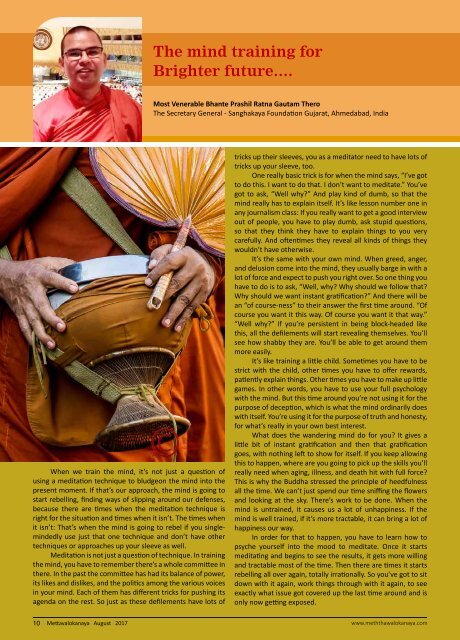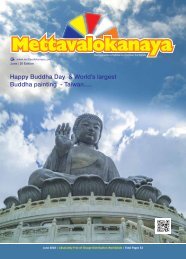Mettavalokanaya_Magazine_August_2017
“Mettavalokanaya” International Buddhist Magazine has been successfully distributed to 40 countries including all districts across Sri Lanka and now “Mettavalokanaya” is Sri Lankan Most Popular & Leading monthly Buddhist Magazine.
“Mettavalokanaya” International Buddhist Magazine has been successfully distributed to 40 countries including all districts across Sri Lanka and now “Mettavalokanaya” is Sri Lankan Most Popular & Leading monthly Buddhist Magazine.
Create successful ePaper yourself
Turn your PDF publications into a flip-book with our unique Google optimized e-Paper software.
When we train the mind, it’s not just a question of<br />
using a meditation technique to bludgeon the mind into the<br />
present moment. If that’s our approach, the mind is going to<br />
start rebelling, finding ways of slipping around our defenses,<br />
because there are times when the meditation technique is<br />
right for the situation and times when it isn’t. The times when<br />
it isn’t: That’s when the mind is going to rebel if you singlemindedly<br />
use just that one technique and don’t have other<br />
techniques or approaches up your sleeve as well.<br />
Meditation is not just a question of technique. In training<br />
the mind, you have to remember there’s a whole committee in<br />
there. In the past the committee has had its balance of power,<br />
its likes and dislikes, and the politics among the various voices<br />
in your mind. Each of them has different tricks for pushing its<br />
agenda on the rest. So just as these defilements have lots of<br />
The mind training for<br />
Brighter future….<br />
Most Venerable Bhante Prashil Ratna Gautam Thero<br />
The Secretary General - Sanghakaya Foundation Gujarat, Ahmedabad, India<br />
tricks up their sleeves, you as a meditator need to have lots of<br />
tricks up your sleeve, too.<br />
One really basic trick is for when the mind says, “I’ve got<br />
to do this. I want to do that. I don’t want to meditate.” You’ve<br />
got to ask, “Well why?” And play kind of dumb, so that the<br />
mind really has to explain itself. It’s like lesson number one in<br />
any journalism class: If you really want to get a good interview<br />
out of people, you have to play dumb, ask stupid questions,<br />
so that they think they have to explain things to you very<br />
carefully. And oftentimes they reveal all kinds of things they<br />
wouldn’t have otherwise.<br />
It’s the same with your own mind. When greed, anger,<br />
and delusion come into the mind, they usually barge in with a<br />
lot of force and expect to push you right over. So one thing you<br />
have to do is to ask, “Well, why? Why should we follow that?<br />
Why should we want instant gratification?” And there will be<br />
an “of course‐ness” to their answer the first time around. “Of<br />
course you want it this way. Of course you want it that way.”<br />
“Well why?” If you’re persistent in being block‐headed like<br />
this, all the defilements will start revealing themselves. You’ll<br />
see how shabby they are. You’ll be able to get around them<br />
more easily.<br />
It’s like training a little child. Sometimes you have to be<br />
strict with the child, other times you have to offer rewards,<br />
patiently explain things. Other times you have to make up little<br />
games. In other words, you have to use your full psychology<br />
with the mind. But this time around you’re not using it for the<br />
purpose of deception, which is what the mind ordinarily does<br />
with itself. You’re using it for the purpose of truth and honesty,<br />
for what’s really in your own best interest.<br />
What does the wandering mind do for you? It gives a<br />
little bit of instant gratification and then that gratification<br />
goes, with nothing left to show for itself. If you keep allowing<br />
this to happen, where are you going to pick up the skills you’ll<br />
really need when aging, illness, and death hit with full force?<br />
This is why the Buddha stressed the principle of heedfulness<br />
all the time. We can’t just spend our time sniffing the flowers<br />
and looking at the sky. There’s work to be done. When the<br />
mind is untrained, it causes us a lot of unhappiness. If the<br />
mind is well trained, if it’s more tractable, it can bring a lot of<br />
happiness our way.<br />
In order for that to happen, you have to learn how to<br />
psyche yourself into the mood to meditate. Once it starts<br />
meditating and begins to see the results, it gets more willing<br />
and tractable most of the time. Then there are times it starts<br />
rebelling all over again, totally irrationally. So you’ve got to sit<br />
down with it again, work things through with it again, to see<br />
exactly what issue got covered up the last time around and is<br />
only now getting exposed.<br />
This is one of the ways in which you learn a lot about<br />
your defilements. It’s not that you have to wait for a totally<br />
solid concentration before you can see the defilements<br />
clearly. A lot of learning about the defilements lies in learning<br />
how to struggle with them as you bring the mind to stillness.<br />
You begin to see: “Oh, this is how greed works, this is how<br />
aversion works, this is how I’ve fallen for this stuff before in<br />
the past. Well, this time around I’m not going to fall.”<br />
Sometimes it’s like a battle. Other times it’s more a<br />
question of learning how to work together in a way that’s for<br />
your own best interests: how to be a mediator, a negotiator, or<br />
a patient teacher. You’ve got to have lots of ways of relating to<br />
the different elements in your mind. The times when you can<br />
win the defilements over to your side: That’s when it’s best.<br />
Your desire turns into a desire to practice. Your hatred turns<br />
into a hatred of the defilements. You learn how to use the<br />
energy of these things for your own true benefit.<br />
That’s when you can be said to be a discerning mediator.<br />
You can’t gain insight simply by following the rules. Somebody<br />
says, “For insight you need to do one, two, three, four, five,<br />
six, and seven. So you do one, two, three, four, five, six, seven<br />
without any thinking, without any reflection on what you’re<br />
doing, and yet that doesn’t give you any true insights. It gives<br />
you pre‐programmed insights sometimes, but the actual<br />
startling new understandings that can come through the<br />
meditation don’t happen because you’re too busy following<br />
the directions.<br />
The directions are there for you to apply to the mind and<br />
then to observe, to look at what happens, to reflect on what<br />
happens, to make adjustments. Make the meditation your<br />
own and not just somebody else’s bulldozer running through<br />
your head. After all, the big issue is how you relate to yourself,<br />
how you relate to the body, how you relate to feelings,<br />
perceptions, thought‐fabrications, and consciousness. That’s<br />
the area where you’re causing yourself suffering, so that’s the<br />
area where you’ve got to gain sensitivity and insight. Nobody<br />
else can get into your head and straighten these things out for<br />
you. You use the techniques of meditation to see what they<br />
reveal about the mind. Then you build on those lessons so<br />
that the meditation becomes your own.<br />
When that’s the kind of mind you have, it’s a really good<br />
mind to live in. We live in physical places only for a certain<br />
amount of time but in our own minds all the time. Try to make<br />
the mind a good place to live so that, no matter what else<br />
happens outside, at least the mind is on proper terms with<br />
itself, not fighting itself, not doing stupid things that aren’t in<br />
its own best interest. Get so that it really does know how to<br />
deal with the aggregates as they arise, how to deal with pain<br />
so it doesn’t turn it into suffering, how to deal with pleasure so<br />
it doesn’t turn it into suffering. Get so that the mind develops<br />
a basic intelligence in sorting itself out, managing itself, so<br />
that all your mental powers suddenly become powers you can<br />
truly put to good use.<br />
As we were saying today, there are times when, for your<br />
own good, you don’t want to be focused on the breath. There<br />
are things you have to think about, things you’ve got to plan<br />
for, things you have to ponder, where you take all the powers<br />
of the mind you’ve trained in concentration and put them<br />
to other uses. That way the benefits of the concentration<br />
permeate your whole life, everything you do.<br />
10 I <strong>Mettavalokanaya</strong> I <strong>August</strong> I <strong>2017</strong><br />
www.meththawalokanaya.com<br />
www.meththawalokanaya.com<br />
<strong>Mettavalokanaya</strong> I <strong>August</strong> I <strong>2017</strong> I 11

















